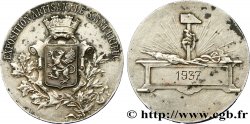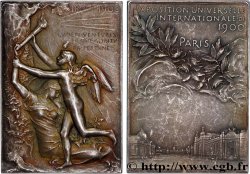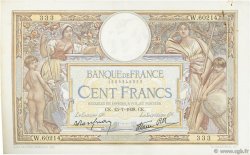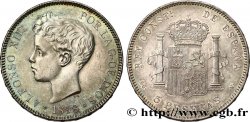fme_993183 - III REPUBLIC Médaille “Jusqu’au bout” du général Gallieni
无库存.
所有在网站上销售的产品 (2025)
价格 : 4.00 €
所有在网站上销售的产品 (2025)
价格 : 4.00 €
种类 Médaille “Jusqu’au bout” du général Gallieni
日期: 1916
铸币厂名称/城市 75 - Paris
材质 copper nickel
直径 31 mm
模子方针 12 h.
硬币制模工 MAILLARD Auguste / PARIS ART
重量 8,34 g.
侧面 lisse
印模 sans poinçon
关于品相的说明
Traces de frottement au revers (rayures). Taches d’oxydation. Présence de quelques coups
正面
正面的文字 ANÉPIGRAPHE.
正面的说明书 Buste à gauche du général Gallieni; signé : AUGte MAILLARD / 1916.
背面
背面的文字 PARIS / 1914-1916 / - / “JUSQU’AU BOUT” / GALLIENI.
背面的说明书 Légende en 3 lignes puis signature : PARIS ART.
评论
Diamètre sans bélière : 28 mm
Joseph Simon Gallieni, né le 24 avril 1849 à Saint-Béat dans la Haute-Garonne et mort le 27 mai 1916 à Versailles, est un militaire et administrateur colonial français. Il exerça une grande partie de son activité dans les opérations de colonisation menées par la France, laissant une empreinte profonde sur l’histoire de la colonisation française, et termina sa carrière pendant la Première Guerre mondiale. Il fut fait maréchal à titre posthume en 1921.
Lorsque le 26 août 1914, le général Gallieni est nommé gouverneur militaire de Paris pour assurer la défense de la capitale, il rassure les Parisiens par ces mots : « J’ai reçu le mandat de défendre Paris contre l’envahisseur ; ce mandat je le remplirai jusqu’au bout. »
Lors de ses funérailles nationales, Georges Clemenceau écrira : « Le général Gallieni est l’homme dont la prompte décision nous a donné la bataille de la Marne. Il est le véritable sauveur de Paris. Les funérailles nationales ne sont qu’un commencement de justice. Avec ses conséquences, le reste suivra. L’heure viendra des jugements et la mémoire de Gallieni peut attendre avec tranquillité l’avenir. »
.
Joseph Simon Gallieni, né le 24 avril 1849 à Saint-Béat dans la Haute-Garonne et mort le 27 mai 1916 à Versailles, est un militaire et administrateur colonial français. Il exerça une grande partie de son activité dans les opérations de colonisation menées par la France, laissant une empreinte profonde sur l’histoire de la colonisation française, et termina sa carrière pendant la Première Guerre mondiale. Il fut fait maréchal à titre posthume en 1921.
Lorsque le 26 août 1914, le général Gallieni est nommé gouverneur militaire de Paris pour assurer la défense de la capitale, il rassure les Parisiens par ces mots : « J’ai reçu le mandat de défendre Paris contre l’envahisseur ; ce mandat je le remplirai jusqu’au bout. »
Lors de ses funérailles nationales, Georges Clemenceau écrira : « Le général Gallieni est l’homme dont la prompte décision nous a donné la bataille de la Marne. Il est le véritable sauveur de Paris. Les funérailles nationales ne sont qu’un commencement de justice. Avec ses conséquences, le reste suivra. L’heure viendra des jugements et la mémoire de Gallieni peut attendre avec tranquillité l’avenir. »
.








 对产品描述纠错
对产品描述纠错 打印
打印 分享我的选择
分享我的选择 提问
提问 Consign / sell
Consign / sell
 产品介绍
产品介绍















